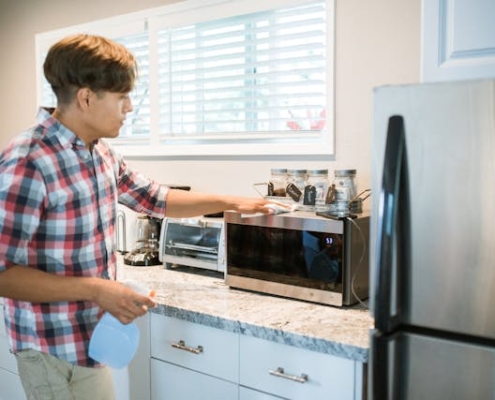How to Repair a Microwave Oven
 Microwave ovens are a staple in most kitchens, but what happens when your trusty microwave stops working? While replacing it might seem like the easiest option, repairing the appliance, or calling in the experts for microwave repair, can save you money and extend its use. This guide will walk you through common microwave problems and repair tips to get your microwave running smoothly again.
Microwave ovens are a staple in most kitchens, but what happens when your trusty microwave stops working? While replacing it might seem like the easiest option, repairing the appliance, or calling in the experts for microwave repair, can save you money and extend its use. This guide will walk you through common microwave problems and repair tips to get your microwave running smoothly again.
Jump to article sections:
- Common Microwave Problems and How to Identify Them
- Safety Precautions Before Repairing a Microwave
- How to Fix a Microwave That Won’t Heat
- What to Do When Your Microwave Makes Strange Noises
- How to Repair a Microwave Door That Won’t Close Properly
- When to Replace Microwave Parts
- DIY Microwave Repairs vs. Hiring a Professional
- When To Replace Your Microwave
- Professional Appliance Repair in Atlanta
1. Common Microwave Problems and How to Identify Them
Some of the most common microwave problems include:
- Microwave not heating – This often points to issues with the magnetron, diode, or capacitor.
- Sparks or arcing inside – Typically caused by damaged waveguide covers, metal inside the cavity, or a faulty diode.
- Microwave making strange noises – Could result from a failing turntable motor, cooling fan, or magnetron.
- Door not closing properly – This is usually due to misaligned latches or hinges.
By accurately identifying the issue, you’ll know which repair steps to follow.
2. Safety Precautions Before Repairing a Microwave
Microwaves can be dangerous to work on if you’re not careful. Here are some critical microwave safety tips to follow before attempting repairs:
- Unplug the microwave – Always disconnect it from the power source.
- Discharge the high-voltage capacitor – Microwaves store high voltage that can pose a risk even when unplugged. Use an insulated screwdriver to discharge it safely.
- Work in a safe area – Ensure proper lighting and plenty of workspace to handle tools and components.
- Wear protective gear – Insulated gloves and safety goggles are basic but essential.
3. How to Fix a Microwave That Won’t Heat
The most common complaint is a microwave that doesn’t heat food properly. Follow these steps:
- Check the Magnetron
- Remove the outer casing and locate the magnetron.
- Use a multimeter to test for continuity. If the magnetron is faulty, replace it.
- Inspect the Diode
- The diode helps with voltage conversion. Test it with a multimeter. If it’s burned out, install a new diode.
- Examine the Capacitor
- A faulty capacitor can prevent heating. Discharge it safely and test with a multimeter. Replace if needed.
Microwave repairs usually require simple tools like screwdrivers, a multimeter, and replacement parts found online or at electronics stores.
4. What to Do When Your Microwave Makes Strange Noises
Unusual noises can be unsettling, but they’re often easy to resolve:
- Turntable motor issues – If the plate isn’t rotating properly, the motor might need replacement. Disconnect the motor and replace it with a new one designed for your microwave model.
- Cooling fan problems – Check the fan for debris or damage. Clean it or replace it if necessary.
- Magnetron buzzing – This might indicate a failing magnetron. Follow the steps in the previous section to test and replace it.
Addressing these noises promptly will prevent further damage.
5. How to Repair a Microwave Door That Won’t Close Properly
A door that won’t close properly can disrupt the microwave’s operation. Here’s how to fix it:
- Inspect the door latches
- Worn or damaged latches can prevent proper closure. Replace them if needed.
- Check the hinges
- Misaligned hinges can cause the door to hang unevenly. Adjust or replace the hinges to ensure alignment.
- Examine the seal
- A torn or worn seal can interfere with the door closure. Replace the seal to regain proper functionality.
Most of these fixes are straightforward and don’t require any specialized tools.
6. When to Replace Microwave Parts
Knowing when to repair or replace parts can save you time and money. Here’s a quick breakdown:
- Replace fuses if the microwave doesn’t power on. Test them with a multimeter to confirm they’re blown.
- Bulbs and lights inside the microwave are simple to replace when burned out.
- Control panel issues may require replacing the entire panel if buttons stop responding.
If the cost of parts exceeds half the price of a new microwave, replacing the appliance might be the better option.
7. DIY Microwave Repairs vs. Hiring a Professional
DIY repairs can be a cost-effective solution for simple fixes like replacing a fuse, changing a light bulb, or cleaning microwave components. However, attempting more complex repairs, like dealing with the magnetron or high-voltage capacitor, can be risky without the proper tools or expertise.
On the other hand, hiring a professional ensures the repair is done safely and correctly. Technicians are equipped to handle intricate issues, such as a faulty control panel or severe heating problems, and can prevent further damage to the appliance. While professional services may cost more upfront, they are often the better choice for ensuring safety and long-term reliability.
8. When to Replace Your Microwave
 If you find yourself wondering if it’s better to repair or replace your microwave, here are some signs to look for:
If you find yourself wondering if it’s better to repair or replace your microwave, here are some signs to look for:
- Frequent breakdowns – If you’re constantly having to repair your microwave, it might be time for a replacement.
- Old age – Most microwaves have an average lifespan of 5-8 years. If your microwave is nearing this range, consider replacing it instead of investing in repairs.
- Outdated features or technology – If your current microwave doesn’t meet your needs or lacks modern features, upgrading to a newer model may be more beneficial in the long run.
9. Professional Appliance Repair in Atlanta
When in doubt, it’s always best to seek the help of a professional appliance repair service. For help in Atlanta, trust Comfort Appliance Repair. Our team of experienced technicians is trained to handle all types of microwave problems, from common repairs to complex issues. We offer fast Atlanta microwave repair, ensuring your appliance is repaired correctly and safely. Don’t risk causing further damage or compromising your safety – contact Comfort Appliance Repair today!
By Dennis Godynuk, Owner of Comfort Appliance Repair
Dennis Godynuk is the owner of Comfort Appliance Repair in Covington, GA. Comfort Appliance provides fast and reliable repair services for all major household appliances. Dennis and his team of experienced technicians can tackle any problem, from broken refrigerators to malfunctioning dishwashers, and their prices are very competitive. Customers can rest easy knowing that their appliances are in good hands when they call Comfort Appliance Repair.



